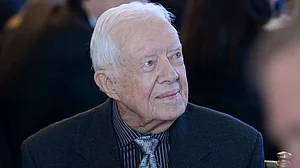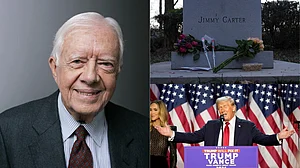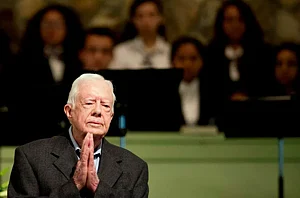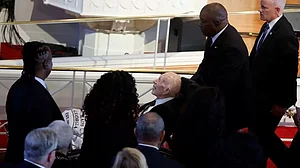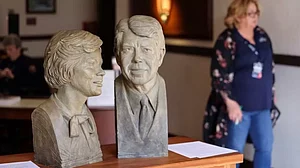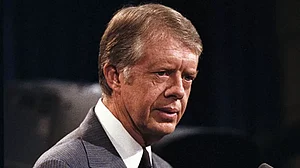
Name: Jimmy Carter
Jimmy Carter emerged from humble beginnings to become the 39th President of the United States. Raised in a rural setting, Carter developed a stance against racial segregation from a young age. He pursued his education at the U.S. Naval Academy, graduating in 1946, and served in the Navy before returning home to revive his family's peanut business.
Carter's political career began in the Georgia State Senate, followed by a term as Governor of Georgia. In 1976, he won the presidential election as a relative outsider. His presidency, from 1977 to 1981, was marked by significant achievements in energy policy and international diplomacy, as well as challenges including economic issues and the Iran hostage crisis. After leaving office, Carter embarked on an extensive humanitarian career, establishing the Carter Center and earning a Nobel Peace Prize in 2002. At 99 years old, he is both the longest-lived U.S. president and holds the record for the longest post-presidency in American history.
Jimmy Carter's military career and early political life were marked by significant achievements and transitions. After graduating from the U.S. Naval Academy in 1946, Carter served in the Navy until 1953, including work with the nuclear submarine program under Captain Hyman Rickover. His naval service included a notable incident at Chalk River Laboratories in Canada, where he participated in the cleanup of a partial nuclear meltdown. Carter left the Navy to take over his family's peanut farm following his father's death, successfully expanding the business despite initial challenges.
Carter's political career began in 1963 when he was elected to the Georgia State Senate. Initially cautious on civil rights issues, he gradually became more outspoken in favor of integration. He ran unsuccessfully for governor in 1966 but won in 1970 with a campaign that controversially appealed to both black voters and supporters of segregationist George Wallace.
As governor from 1971 to 1975, Carter surprised many by declaring an end to racial discrimination in his inaugural speech. He implemented significant reforms in education, mental health, and criminal justice, while also focusing on environmental issues. Throughout his term, Carter positioned himself for a potential presidential run, engaging in national politics and joining influential organizations like the Trilateral Commission. His tenure as governor and his growing national profile laid the groundwork for his successful 1976 presidential campaign.
Jimmy Carter's presidency, spanning from 1977 to 1981, was marked by significant challenges and notable achievements. After winning the 1976 election as an outsider candidate, Carter faced a complex domestic and international landscape. His administration focused heavily on energy policy, implementing conservation measures and creating the Department of Energy in response to the ongoing energy crisis. Carter's presidency was characterized by his emphasis on human rights, environmental concerns, and efforts to broker peace in the Middle East, culminating in the Camp David Accords.
However, Carter's tenure was also beset by economic difficulties, including high inflation and unemployment, which contributed to a sense of national malaise. His relationship with Congress was often strained, as he struggled to pass key legislation and faced opposition from both Republicans and members of his own Democratic Party. Carter's foreign policy faced significant challenges, particularly the Iran hostage crisis, which began in 1979 and lasted until the end of his presidency. Despite his efforts to address these issues, including his famous "malaise speech" urging Americans to confront a crisis of confidence, Carter's popularity declined. These factors, combined with a resurgent Republican Party led by Ronald Reagan, ultimately led to Carter's defeat in the 1980 election, ending his presidency after a single term.
Significant economic challenges and foreign policy initiatives marked Jimmy Carter's presidency. Economically, his term saw a period of recovery followed by high inflation, rising interest rates, and slow growth, exacerbated by the 1979 energy crisis. Carter implemented deregulation policies, notably in the airline industry, and attempted healthcare reform. In education, he established the Department of Education and expanded the Head Start program.
On the international stage, Carter's presidency was defined by several key events and policies. He brokered the Camp David Accords between Israel and Egypt, a landmark achievement in Middle East peace efforts. Carter also pursued improved relations with China, formally recognizing the People's Republic of China and severing diplomatic ties with Taiwan. His administration faced significant challenges with the Iran hostage crisis, which began in 1979 and lasted until the end of his presidency. Carter's approach to the Soviet Union initially focused on arms control and détente, resulting in the SALT II treaty, but became more assertive following the Soviet invasion of Afghanistan.
Despite these efforts, Carter's presidency was ultimately overshadowed by domestic economic troubles and the ongoing hostage crisis in Iran. These factors, combined with changing political tides, contributed to his defeat in the 1980 election. However, Carter's post-presidency has been marked by continued diplomatic efforts and humanitarian work, enhancing his legacy beyond his time in office.
Carter has been involved in high-profile negotiations, such as his 1994 mission to North Korea on behalf of the Clinton administration, where he negotiated with Kim Il Sung. He has also been part of "The Elders," a group of global leaders working on peace and human rights issues. Throughout his post-presidency, Carter has not shied away from controversy, openly criticizing Israeli policies while maintaining support for the country.
His diplomatic efforts have continued into his later years, including attempts to engage with difficult regimes such as Zimbabwe and Syria. Carter has also offered his services as a diplomatic envoy to North Korea during times of heightened tensions with the United States. These ongoing efforts demonstrate Carter's commitment to international diplomacy and conflict resolution long after leaving the presidency, making him one of the most active and influential former presidents in U.S. history in terms of global diplomacy.
Jimmy Carter's post-presidency has been characterized by his continued engagement in national and international affairs, often offering commentary on various administrations and political issues. He has maintained an active voice in American politics, critiquing policies and actions of subsequent presidents from both parties, including Reagan, Clinton, Bushes, Obama, and Trump. Carter has not shied away from expressing his opinions on controversial topics, from foreign policy decisions to domestic issues.
Throughout the years, Carter has played a role in presidential elections, sometimes endorsing candidates and speaking at party conventions. His involvement has ranged from endorsing fellow Democrats to occasionally supporting Republican primary candidates. Carter has been particularly outspoken about election integrity, notably commenting on the 2000 and 2016 elections.
Despite occasional criticisms of sitting presidents, Carter has generally sought to contribute constructively to national dialogues. He has continued to advocate for causes he believes in, such as environmental protection, as evidenced by his involvement in the Alaska land swap case in 2022. Jimmy Carter's personal life and legacy are marked by both tragedy and triumph. He experienced the loss of his three younger siblings to pancreatic cancer, but found enduring love with his wife Rosalynn, with whom he shared 77 years of marriage until her passing in 2023. The Carters raised four children and enjoyed a large extended family, including numerous grandchildren and great-grandchildren.
Carter's later years have been characterized by health challenges, including a cancer diagnosis in 2015 which he overcame, and more recent falls and hospitalizations. In February 2023, at the age of 98, Carter entered hospice care at his home in Plains, Georgia. Despite these health issues, he has achieved remarkable longevity, becoming the longest-lived U.S. president in history.
While Carter's presidency was initially viewed critically by some scholars, his post-presidential work in diplomacy, human rights, and humanitarian causes has significantly elevated his reputation. He has received numerous awards and honors, including the Nobel Peace Prize in 2002, multiple Grammy Awards for his audiobooks, and various tributes such as the naming of a submarine and an airport in his honor. Although opinions on his presidency remain mixed, Carter is widely respected for his integrity, his commitment to peace, and his extensive humanitarian work, cementing his legacy as one of the most impactful former presidents in American history.
